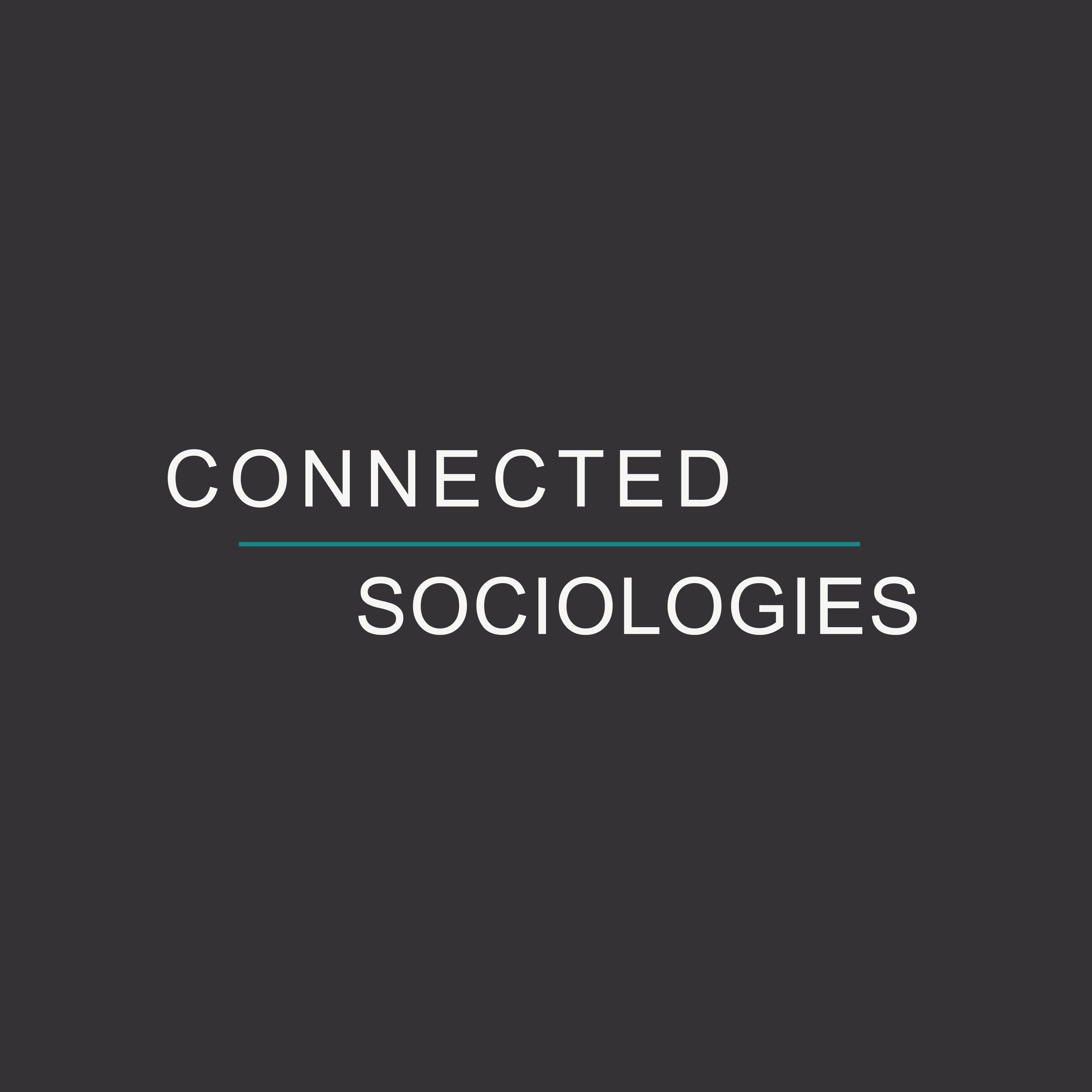
7.4K
Downloads
32
Episodes
Sociology is based on a conventional view of the emergence of modernity and the ‘rise of the West’. This privileges mainstream Euro-centred histories. Most sociological accounts of modernity, for example, neglect broader issues of colonialism and empire. They also fail to address the role of forced labour alongside free labour, issues of dispossession and settlement, and the classification of societies and peoples by their ‘stages of development’. The Connected Sociologies Curriculum Project responds to these challenges by providing resources for the reconstruction of the curriculum in the light of new connected histories and their associated connected sociologies. The project is designed to support the transformation of school, college, and university curricula through a critical engagement with the broader histories that have shaped modern societies.
Episodes
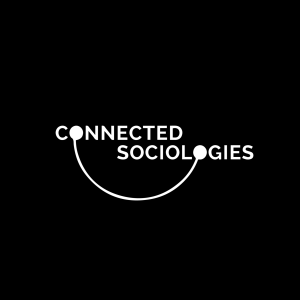
Tuesday Oct 19, 2021
Tocqueville: America and Algeria - Prof Gurminder K Bhambra
Tuesday Oct 19, 2021
Tuesday Oct 19, 2021
Alexis Charles Henri Maurice Clérel, Comte de Tocqueville was born in 1805 into the French nobility and a family estate in Normandy. He died in 1859. His wider family was part of the conservative reaction to the changes brought about by the French Revolution in 1789, but Tocqueville, himself, looked forward. He participated in public office, initially as a magistrate and subsequently as a deputy of the Constituent Assembly, rising briefly to Minister of Foreign Affairs in 1849. He travelled to the United States between May 1831and February 1832 with his friend Gustave Beaumont, ostensibly to study penal institutions, but instead published a two-volume study of Democracy in America. Throughout his life, he commented on contemporary politics and public affairs, including France’s occupation of Algeria. The politics of the period were frequently in turmoil and this instability was a motivating concern of Tocqueville in his search for the conditions of a more stable order.
Reading
- Bhambra, Gurminder K. and John Holmwood 2021. ‘Tocqueville: From America to Algeria’ in Colonialism and Modern Social Theory. Cambridge: Polity
- Chandra, Rajshree 2013. ‘Tocqueville for Our Times,’ Economic and Political Weekly 48 (10): 32-35
- Pitts, Jennifer (ed) 2001. Writing on Empire and Slavery: Alexis de Tocqueville. Edited and translated by Jennifer Pitts. Baltimore: The John Hopkins Press
- Richter, Melvin 1963. ‘Tocqueville on Algeria,’ The Review of Politics 25 (3): 362–398
- Stokes, Curtis 1990. ‘Tocqueville and the Problem of Racial Inequality,’ The Journal of Negro History 75 (1/2): 1-15
- Tocqueville, Alexis de 2001 [1841]. ‘Essay on Algeria’; [1843]. ‘The Emancipation of Slaves’; [1847]. ‘First Report on Algeria’ in Jennifer Pitts (ed) Writing on Empire and Slavery: Alexis de Tocqueville. Edited and translated by Jennifer Pitts. Baltimore: The John Hopkins Press
- Tocqueville, Alexis de 2004 [1835]. Democracy in America. Translated by Arthur Goldhammer. Editor Olivier Zunz. New York: Penguin Random House
- Tocqueville, Alexis de 2008 [1856]. The Ancien Regime and the Revolution. Translated and Edited by Gerald Bevan. London: Penguin
Resources
Bhambra, Gurminder K. 2021. ‘The Haitian Revolution’ Connected Sociologies Curriculum Project video lecture.
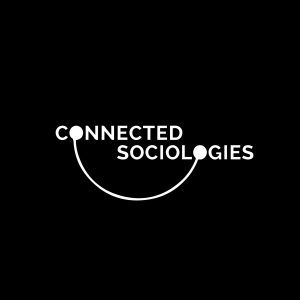
Tuesday Oct 19, 2021
Early Modern Social Theory: Europe and its ‘Others’- Prof John Holmwood
Tuesday Oct 19, 2021
Tuesday Oct 19, 2021
This session looks at the beginnings of modern European social theory in the seventeenth and eighteenth centuries. The English political philosophers, Thomas Hobbes (1588-1679) and John Locke (1632-1704), set out a distinction between the ‘state of nature’ and the ‘state of society’ in order to identify rights and obligations associated with private property. Their writings are widely seen in the context of the later development of capitalism, but are much more directly concerned with the justification of colonialism with which they were each directly engaged. In the eighteenth century, writers associated with the Scottish Enlightenment –for example, David Hume (1711-1776), Adam Smith (1723-1790), William Robertson (1721-1793), John Millar (1735-1801), and Adam Ferguson (1723-1816) – developed a typology of different types of society as stages of historical development. In this session, we consider how these ideas contributed to the view that ‘freedom’ was a product of European modernity and that modernity operated in terms of an internal logic from which colonialism was effaced.
Reading
- Bhambra, Gurminder K. and John Holmwood 2021. ‘Hobbes to Hegel: Europe and its Others’ in Colonialism and Modern Social Theory. Cambridge: Polity
- Hegel, G. W. F. 1975 [1830]. Lectures on the Philosophy of World History. Introduction: Reason in History. Translated by H. B. Nisbet. Cambridge: Cambridge University Press
- Hobbes, Thomas 1991 [1651]. Leviathan. Edited by Richard Tuck. Cambridge: Cambridge University Press
- Lebovics, Herman 1986. ‘The Uses of America in Locke's Second Treatise of Government,’ Journal of the History of Ideas 47 (4): 567-581
- Locke, John 1960 [1698]. Two Treatises of Government. Edited with an Introduction and Notes by Peter Laslett. Cambridge: Cambridge University Press
- Meek, Ronald 1976. Social Science and the Ignoble Savage. Cambridge: Cambridge University Press
- Welchman, Jennifer 1995. ‘Locke on Slavery and Inalienable Rights,’ Canadian Journal of Philosophy 25 (1): 67-81
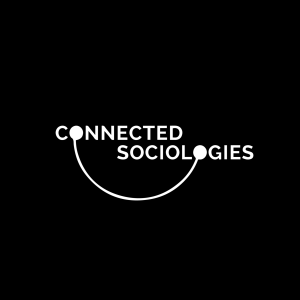
Tuesday Oct 12, 2021
Decolonising Modern Social Theory - Prof Gurminder K Bhambra
Tuesday Oct 12, 2021
Tuesday Oct 12, 2021
Modern social theory is a product of the very history it seeks to interpret and explain. In this module, we address the categories that form mainstream sociology in order to reconstruct modern social theory. We focus on five key sociological figures of the nineteenth and early twentieth century – Tocqueville, Marx, Weber, Durkheim, and Du Bois. Our purpose is to expose the significance of colonialism and empire in the organisation of the thought of these writers and, thereby, in the legacies they bequeath to social theory. Addressing colonial histories is a necessary preliminary to the reconstruction of social theory.
Reading
- Bhambra, Gurminder K. and John Holmwood 2021. ‘Introduction: Colonialism, Historiography, and Modern Social Theory’ in Colonialism and Modern Social Theory. Cambridge: Polity
- Connell, R. W. 1997. ‘Why Is Classical Theory Classical?’ American Journal of Sociology 102 (6): 1511-1557
- Mamdani, Mahmood 2018. ‘The African University,’ London Review of Books Vol. 40 No. 14
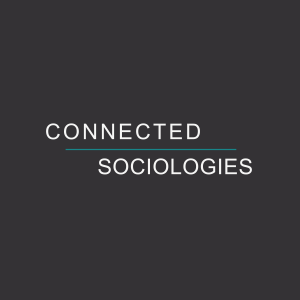
Tuesday Jul 27, 2021
Security in the War on Terror: Predict, Prevent, Police
Tuesday Jul 27, 2021
Tuesday Jul 27, 2021
The Global War on Terror, which was launched in response to the attacks in America on September 11th, has strengthened approaches to securitisation in its attempt to eliminate terrorism. The figure of the ‘terrorist’ is closely associated with that of the Muslim man who through laws and policies related to counter-terrorism and counter-extremism, such as the Prevent Duty, is constructed as a risk and threat to society. From the Global North to the Global South, racialised communities, especially those racialised as Muslim, experience the War on Terror in their everyday spaces such as in schools and healthcare settings, as the frontlines of the war constantly expand. As we approach the 20-year anniversary of the 9/11 attacks, it is clear that anti-terrorism measures are becoming a permanent feature of society, despite being declared during a state of emergency.
In this lesson, we will explore what the emergence of the War on Terror meant for security and, how the US and the West more generally became viewed as ‘exceptional’ forces. Through a focus on the Prevent Duty, we will examine how the War on Terror deploys pre-emptive measures to tackle the threat of terrorism, all of which contributes to rising levels of Islamophobia in society. We consider how such securitising measures have become embedded within the ‘everyday’ and what the consequences are, specifically those racialised as Muslim.
Readings
- CAGE. (2016) The ‘Science’ of Pre-Crime: The Secret ‘Radicalisation’ Study Underpinning Prevent’.
- Fernandez, S., Faure Walker, R. and Younis, T. (2018) The ‘Where’ of Prevent. Discover Society.
- Kundnani, A. 2009. Spooked! How not to prevent violent extremism. Available at: https://www.kundnani.org/wp-content/uploads/spooked.pdf
- Open Society Justice Initiative (2016) Eroding Trust: The UK’s Prevent Counter-extremism Strategy in Health and Education.
- Medact (2021) Racism, mental health and pre-crime policing: the ethics of Vulnerability Support Hubs.
- Shafi, A. (2021) The 9/11 complex: The political economy of counter-terrorism. TNI.
- Sian, K. (2017) “Born radicals? Prevent, positivism and ‘race-thinking’”. Palgrave Communications.
- TNI (2019)Leaving the War on Terror: A Progressive Alternative to Counter-Terrorism Policy.
Resources
- Ramesh, R. and Halliday, J. (2015) ‘Student accused of being a terrorist for reading book on terrorism’. The Guardian.
- PositiveNegatives Representing Islam on Campus
Questions for Discussion
- How do pre-emptive security measures increase feelings of insecurity?
- In what ways has the War on Terror become a permanent feature of everyday life?
- To what extent has the War on Terror designated certain groups of people as security threats? In what ways can we challenge these assumptions?
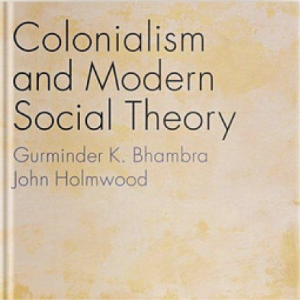
Tuesday Jul 27, 2021
Colonialism & Modern Social Theory: Book Launch and Discussion
Tuesday Jul 27, 2021
Tuesday Jul 27, 2021
About this event
Modern society emerged in the context of European colonialism and empire. So, too, did a distinctively modern social theory, laying the basis for most social theorising ever since. Yet colonialism and empire are absent from the conceptual understandings of modern society, which are organised instead around ideas of nation state and capitalist economy.
In Colonialism & Modern Social Theory, Gurminder K. Bhambra and John Holmwood address this absence by examining the role of colonialism in the development of modern society and the legacies it has bequeathed. Beginning with a consideration of the role of colonialism and empire in the formation of social theory from Hobbes to Hegel, the authors go on to focus on the work of Tocqueville, Marx, Weber, Durkheim and Du Bois. As well as unpicking critical omissions and misrepresentations, the chapters discuss the places where colonialism is acknowledged and discussed – albeit inadequately – by these founding figures; and we come to see what this fresh rereading has to offer and why it matters. This inspiring and insightful book argues for a reconstruction of social theory that should lead to a better understanding of contemporary social thought, its limitations, and its wider possibilities.
In this event, Gurminder K. Bhambra and John Holmwood are in dialogue with Michaela Benson and Su-ming Khoo and respond to questions and comments relating to the book and to the canon of modern social theory itself.
Authors:
Gurminder K Bhambra is Professor of Postcolonial and Decolonial Studies at the University of Sussex, a Trustee at the Sociological Review Foundation, and a Fellow of the British Academy. She is co-editor of Discover Society, an online social research magazine, and editor of Global Social Theory. She is author of the prize-winning Rethinking Modernity: Postcolonialism and the Sociological Imagination and Connected Sociologies. She is also co-editor of Decolonising the University and the Project Director of the Connected Sociologies Curriculum Project.
John Holmwood is Emeritus Professor of Sociology at the University of Nottingham. He was expert witness for the defence in misconduct cases brought against senior teachers falsely accused of a plot to Islamicise schools in Birmingham. Together with Therese O'Toole, he is author of Countering Extremism in Birmingham Schools? The Truth about the Birmingham Trojan Horse Affair (Policy Press, 2018).
Discussants
Professor Michaela Benson is a sociologist with expertise in migration, citizenship and identity. In particular, her research focuses on Britishness and belonging among Britain’s emigrants and overseas citizens at moments of major political transformation including Brexit and decolonisation. Her current position as Professor of Public Sociology at Lancaster University (from 1 June 2021), builds on nearly twenty years of teaching in universities around the UK and her service since 2016 as Editor-in-Chief of The Sociological Review. She has published several academic monographs including The British in Rural France (Manchester University Press, 2011), and Lifestyle Migration and Colonial Traces in Malaysia and Panama (co-authored with Karen O’Reilly; Palgrave, 2018) and numerous journal articles. In recent years, she has developed a profile as a public social science communicator, with a portfolio that includes freelance writing for major outlets, public speaking, and podcasting. Her current research for the project Rebordering Britain and Britons after Brexit (MIGZEN) is funded by the ESRC.
Dr Su-ming Khoo is a Senior Lecturer in Political Science and Sociology, and leads the Environment, Development and Sustainability (Whitaker Institute) and Socio-Economic Impact (Ryan Institute) Research Clusters at NUI Galway. She researches and teaches on human rights, human development, public goods, development alternatives, decoloniality, global activism, and higher education.
This event is hosted by the Connected Sociologies Curriculum Project which seeks to make available open access resources for the teaching of sociology. It emerges out of discussions about the need to broaden our understandings of the past – to be inclusive of colonial and imperial histories – in developing our understandings of the present. The Connected Sociologies Curriculum Project is funded by the Sociological Review Foundation.
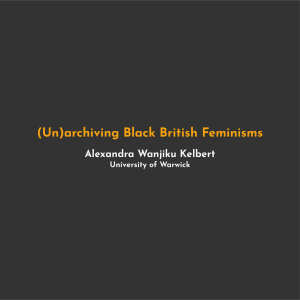
Tuesday Jul 27, 2021
(Un)archiving Black British Feminisms
Tuesday Jul 27, 2021
Tuesday Jul 27, 2021
Black Feminism draws attention to the ways in which racialised, gendered and classed structures and discourses interact to position women differently in relation to white supremacist and patriarchal systems of oppression. In Britain, Black British Feminism offered not just a challenge to the white feminist theoretical claim to universal womanhood but offered a political space through which racialized women were able to develop their own political frames and build their own campaigns and struggles. In this session we consider the lessons that can be learnt from Black British Feminist theories and struggles. The session also raises some epistemological questions about what histories we have access to or not, the gap between the ‘facts of what happened’ and ‘that which is said to have happened’ (Trouillot 1995) and ways to remedy some of these gaps, by drawing on insights from a project funded by the Feminist Review Trust. While the session does not provide a detailed account of Black British Feminist thought and action, the resources listed below offer fascinating insights for Black Feminist enthusiasts.
Readings
- Amos, Valerie, Lewis, G., Mama, A. and Parmar, P. (eds.). 'Many voices, one chant: black feminist perspectives'. Feminist Review, Autumn 1984, Issue 17.
- Amos V, Parmar P. Challenging Imperial Feminism. Feminist Review. 1984; 17 (1): 3-19.
- Beverley Bryan, Stella Dadzie and Suzanne Scafe (1986). Heart of the Race: Black Women's Lives in Britain. Virago.
- Carby, Hazel (1982). White woman listen! Black feminism and the boundaries of sisterhood.
- Grewal, S., Kay, J., Landor, L., Lewis, G. and Parmar, P. (1998). Charting the Journey: Writings by Black and Third World Women. Sheba Press.
- Jonsson, T (2016). The narrative reproduction of white feminist racism. Feminist Review 113 (1): 50-67. July 2016.
- Mirza, Heidi Safia (1997). Black British Feminism: A Reader (eds.) Routledge.
- Sudbury, Julia (1998). ‘Other kinds of dreams’: black women’s organisations and the politics of transformation. Routledge.
- Swaby, Nydia (2014) “'Disparate in Voice, Sympathetic in Direction': Gendered Political Blackness and the Politics of Solidarity.” Feminist Review, no. 108: 11-25.
- Trouillot, Michel-Rolph (2015). Silencing the Past: Power and the Production of History. Beacon Press.
- Watt, D. and Jones, A (2015). Catching Hell and Doing Well: Black women in the UK - the Abasindi cooperative. London: IOE Press.
- Wilson, Amrit Finding a Voice: Asian Women in Britain (London: Virago, 1978)
Resources
BCA –Heart of the Race Oral Histories.
Remembering Olive Morris Collective.
Questions for Discussion
- What can we learn from Black British feminist thought and modes of struggle?
- In what ways does Black British Feminist thought and activism challenge white feminist theoretical claims to universal womanhood?
- What Black British feminist knowledge/stories are hidden? How might we recover or access them?

Tuesday Jul 27, 2021
Enclosures and The Making of the Modern World
Tuesday Jul 27, 2021
Tuesday Jul 27, 2021
It has long been argued that the enclosure of land in England facilitated the agricultural and industrial revolutions that transformed Britain into a modern capitalist state. Yet the connections between land enclosures within England and the English-led colonial enclosures that were taking place at the same time have been less explored. This session examines connections between the enclosure of land and people within England and within the colonial world (from the 16th century). In contrast to nation-bound understandings of English capitalist modernity, which focus on land enclosures, the Industrial revolution, and the formation of a new class society within England, this session is concerned with English colonial enclosures on a global scale, and with understanding Britain as an Imperial State, whose multiracial class society was forged through Empire.
Keywords. Enclosure, Agrarian Revolution, Industrial Revolution, Slavery, Indenture, Waged Labour, Colonialism, Capitalism, Plantation, Factory
Reading
- Baptist, Edward. 2014. The Half Has Never Been Told: Slavery and the Making of American Capitalism. New York: Basic Books.
- Bhambra, Gurminder. 202. ‘Colonial global economy: towards a theoretical reorientation of political economy’, Review of International Political Economy, 28:2, 307-322
- Federici, Silvia. 2004. Caliban and The Witch: Women, The Body and Primitive Accumulation. United States: Autonomedia
- Hayes, Nick, 2020, The Book of Trespass: Crossing the Lines that Divide Us. London, Bloomsbury.
- Johnson, Walter, 2004, ‘The Pedestal and the Veil: Rethinking the Capitalism/Slavery Question’ Journal of the Early Republic, 24, 2, pp. 299-308
- Linebaugh, Peter, 2014. Stop, Thief! : The Commons, Enclosures, And Resistance. PM Press
- Polanyi, Karl. 2001. The Great Transformation: The Political and Economic Origins of Our Time. Boston, MA: Beacon Press.
- Thompson, Edward Palmer. 1963. The Making of the English Working Class. New York: Vintage.
- Robinson, Cedric J. 2000. Black Marxism: The Making of the Black Radical Tradition. Chapel Hill, N.C: University North Carolina Press.
- Shilliam, Robbie. 2018. Race and the Undeserving Poor: From Abolition to Brexit. Newcastle UK: Agenda Publishing.
- Tyler, Imogen. 2020. Stigma: the Machinery of Inequality, London: Zed. [Open Access extract ‘Colonise at home!’ Paupers, Serfs, Slaves and the making of the English State’]
- Virdee Satnam. ‘Racialized capitalism: An account of its contested origins and consolidation’ The Sociological Review. 2019;67(1):3-27.
- Williams, Eric, 1944, Capitalism and Slavery, Chapel Hill: N.C: University North Carolina Press.
Resources
A Short History of Enclosure in Britain.
National Archives Enclosure Maps:
Casualties of History podcast from Jacobin magazine focusing on EP Thompson’s The Making of the English Working Class.
Slavery and its Legacies Podcast.
The 1619 Project podcasts – The Economy That Slavery Built.
Questions
- What are enclosures?
- What is the relationship between enclosures of land and people within England and within English Colonies, that are taking place at the same time?
- Why is the global colonial history of enclosures important for understanding the making of the Modern World?
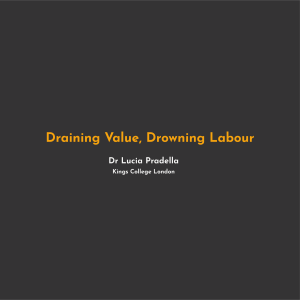
Tuesday Jul 27, 2021
Draining Value, Drowning Labour - Dr Lucia Pradella
Tuesday Jul 27, 2021
Tuesday Jul 27, 2021
How much did the British gain from their empire? According to some calculations, Britain drained a total of nearly $45 trillion from India alone between 1765 and 1938: seventeen times more than the total annual GDP of the UK today. This huge amount of wealth was transferred unilaterally from India to England via trade, banking and administrative mechanisms. While India got nothing in return, the colonial drain played an important role in both the so-called primitive accumulation of capital in England and the reproduction of its industrial system. Only part of this wealth was reinvested in India, and in a way that kept India in a subordinate position within the British colonial empire. This lecture will look at the early theorizations of the colonial drain and discuss the importance of understanding it as part of the overall development of the global capitalist system. Crucially, processes of colonial extraction and dispossession pushed more and more people into the reserve army of English capital, forcing them to emigrate either to other British colonies, as in the case of India, or to England itself, as in the case of Ireland. But does this framework still hold true today, when formal colonial empires seem to be closing their borders to prevent immigration, at huge human cost? Looking beyond the surface of European rhetoric of border controls and its presence in Africa reveals the enduring presence of processes of colonial extraction – of both wealth and labour.
Reading
- Hamza Hamouchene (2019), Extractivism and Resistance in North Africa, Transnational Institute
- Karl Marx (1988), On Ireland - Marx to Sigfrid Meyer and August Vogt. April 1870. In Collected Works 43 – Marx and Engels: 1868-1870. Lawrence & Wishart, pp. 471-476
- Utsa and Prabhat Patnaik (2016), A Theory of Imperialism, Columbia University Press
- Lucia Pradella and Rossana Cillo (2020) Bordering the surplus population across the Mediterranean: Imperialism and unfree labour in Libya and the Italian countryside. Geoforum
- Ajai Sreevatsan (2018), British Raj siphoned out $45 trillion from India: Interview to Utsa Patnaik Mint
- Harsha Walia (2014), Undoing Border Imperialism, AK Press
Resources
- Exodus – Escape from Libya, episode 0 (2018)
- Global Social Theory -Utsa Patnaik
Questions for Discussion
- What is the colonial drain?
- What is the link between colonial/neo-colonial drain and migration?
- What light does situating borders within broader imperialist dynamics shed on the so-called ‘migration crisis’ in Europe?
- How do immigrants describe their experience of detention and forced labour in Libya?

Monday May 17, 2021
Monday May 17, 2021
The main role of organized anti-slavery during the late nineteenth and early twentieth centuries was to both legitimate and reinforce deeply rooted hierarchies which saw European states and their peoples position themselves at the moral and racial apex of ‘civilization’. Centuries of death and destruction associated with Transatlantic slavery firmly dispatched to the past, despite their continuing and catastrophic effects, thereby enabling Europeans to be reborn as abolitionists rather than enslavers. The foundational premise of organized anti-slavery – no one should be enslaved – would come to be primarily understood in terms of paternalistic ‘protection’, with ‘civilized’ Europeans justifying unprovoked wars of colonial conquest as ‘humanitarian’ missions to prevent ‘savage’ and ‘backward’ peoples in other parts of the globe from enslaving each other. Appeals to moral and religious enlightenment (the ‘civilising mission’) and altruistic sacrifice (the ‘white man’s burden’) proved to be hugely important. By treating their non-European subjects as ‘backward children’, who were said to be unable to make decisions for themselves, Europeans were able to both justify and excuse any number of external actions and interventions. Tragically, these actions included countless examples of death, exploitation, extraction, violence and abuse, which exposed the fundamental hollowness of European pretentions towards moral superiority. Slavery would be banished symbolically via legal abolition while many of its defining features continued alongside everyday forms of violence and exploitation. In case after case, governments who congratulated themselves on abolishing slavery would continue to justify and defend numerous acts of violence and coercion directed against ‘inferiors’ and ‘outsiders’.
Readings
The material presented here is primarily based upon the following paper:
- Joel Quirk, ‘Political Cultures’, A Cultural History of Slavery and Human Trafficking in the Age of Global Conflict, Henrice Altink (ed.) (London: Bloomsbury, in press). Minor changes in language are possible prior to publication.
Other useful reading materials include:
- Joel Quirk, Uncomfortable Silences: Anti-Slavery, Colonialism and Imperialism, Historians Against Slavery, 13 February, 2015.
- Joel Quirk, Reparations are too confronting: Let’s talk about Modern Slavery instead, openDemocracy, 7 May 2015.
- Aimé Césaire, Discourse on Colonialism, (New York: Monthly Review Press 1972). Originally published in French in 1955.
- Binyavanga Wainaina, How to Write About Africa. Granta, 92. 2005.
- Teju Cole, The White-Savior Industrial Complex, The Atlantic, March 21, 2012. Toby Green, How the End of Atlantic Slavery paved a path to colonialism, Aeon,
30 March 2021. - Emily Burrill, State of Marriage: Gender, Justice and Rights in Colonial Mali (Athens: Ohio University Press, 2015).
- Martin Klein, Slavery and Colonial Rule in French West Africa, (Cambridge: Cambridge University Press, 1998).
- Eric Allina, Slavery by Any Other Name: African Life under Company Rule in Colonial Mozambique (Charlottesville: University of Virginia Press, 2012).
- Robert Burroughs, African Testimony in the Movement for Congo Reform : The Burden of Proof (Abington: Routledge, 2018).
- Alice Bellagamba, Sandra Greene, Martin Klein (eds.) African voices on slavery and the slave trade, (Cambridge: Cambridge University Press, 2013).
Resources
- Slave Voyages (essential starting point for the history of Transatlantic enslavement)
- UNESCO General History of Africa (free downloads, multiple languages).
- Basil Davidson, Africa Episode 5 The Bible & The Gun, and Episode 6 The Magnificent African Cake.
- Liberated Africans (database on enslaved Africans freed in the nineteenth century).
- Stanford, Africa South of the Sahara (online database of primary sources)
- Bouillagui: A Free Village (multimedia platform on slavery and abolition in Mali, in both French and English).
- Imperialism/Colonialism in Africa Resource Links.
- Africa is a country (essential starting point for African politics and history)
Questions for Discussion
- Colonialism was primarily driven by economic and political interests, yet was frequently justified and defended using appeals to a ‘higher purpose’. What does the close relationship between anti-slavery and European colonialism say about the politics and prospects of humanitarianism and altruism more broadly?
- What are the defining features of paternalism as both an ideology and practice? How do these defining features pave the way for systems of violence and coercion?
- What does the history of legal reforms targeting enslavement say about the limits and possibilities of legal solutions to complex problems? What should we make of the introduction of various laws which were designed to reconstitute and extend core features of enslavement after slavery had been legally abolished?
- How does the history of slavery and abolition in the late ninetieth and early twentieth century influence how we think about slave resistance, both individual and collective?
- Where and how do models of hierarchy and ‘supremacy’ which were dominant during the age of high imperialism continue to have effects upon politics and society today?

Monday May 17, 2021
Policing "Gangs" - Dr Patrick Williams
Monday May 17, 2021
Monday May 17, 2021
What is a ‘gang’? Whilst the disciplines of Criminology and Sociology have long grappled with this question, the answer is increasingly of no relevance to criminal justice policies that claim to address the problem of violent crime across England and Wales. Within the context of contemporary policing and law enforcement, the ‘gang’ has evolved as a ‘transcendental signifier’ (Alexander 2008) and today serves to legitimise intrusive and harmful policing practices as part of a gang-industry (Williams 2014). Of particular concern to this session, a cursory glance at police gang databases reveals that those who are ‘suspected’ by the police as ‘gang members’, associated to gangs or are ‘at risk’ of gang violence are from minoritised groups and particular black young men. In this session, we explore the factors which have given rise to the racialised construction of the ‘gang’ and consider the harms experienced and endured by those who are policed with suspicion.
Reading
- Alexander, Claire. (2008). (Re)thinking 'Gangs'. Runnymede Perspectives.
- Amnesty International (2018) Trapped in the Matrix. London: Amnesty. Secrecy, stigma, and bias in the Met's Gangs Database
- Bridges, Lee (2015) The Met Gangs Matrix - Institutional Racism in Action. Institute for Race Relations.
- Muncie, John. The Theory and Politics of Criminalisation. CJM 74.
- Williams, Patrick. (2014) Criminalising the Other: challenging the race-gang nexus. Race & Class, 56(3), 18-35.
- Williams, Patrick and Clarke, Becky (2016)Dangerous Associations: Joint Enterprise, Gangs and Racism. London: Centre for Crime and Justice Studies.
Resources
- Scott, Stafford. (2018)The War on Gangs or a Racialised War on Working Class Black Youth. London: The Monitoring Group.
- StopWatch.
- Information Commissioners Office (2018) ICO finds Metropolitan Police Service’s Gangs Matrix breached data protection laws.
Questions for discussion
- Consider the multiple ways in which the gang label is (mis)used in contemporary policing and law enforcement practice.
- With reference to processes of criminalisation reflect upon the State’s response to particular forms of music - how may this relate to the mediated construct of the gang.
- Given it is not a criminal offence to be in a gang, why do you think so much government resource and media attention has been given to this construct?
